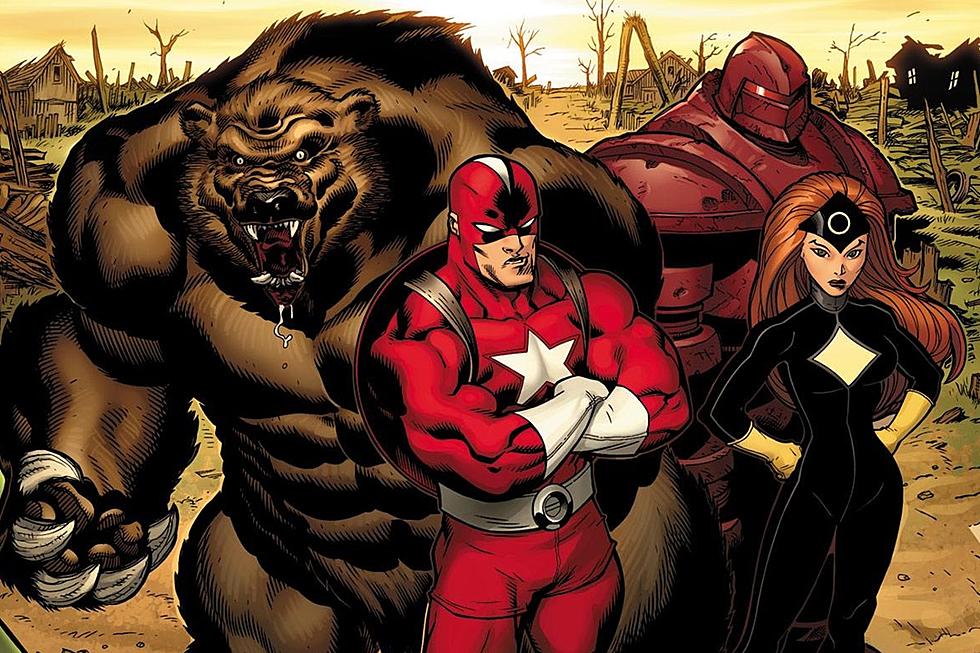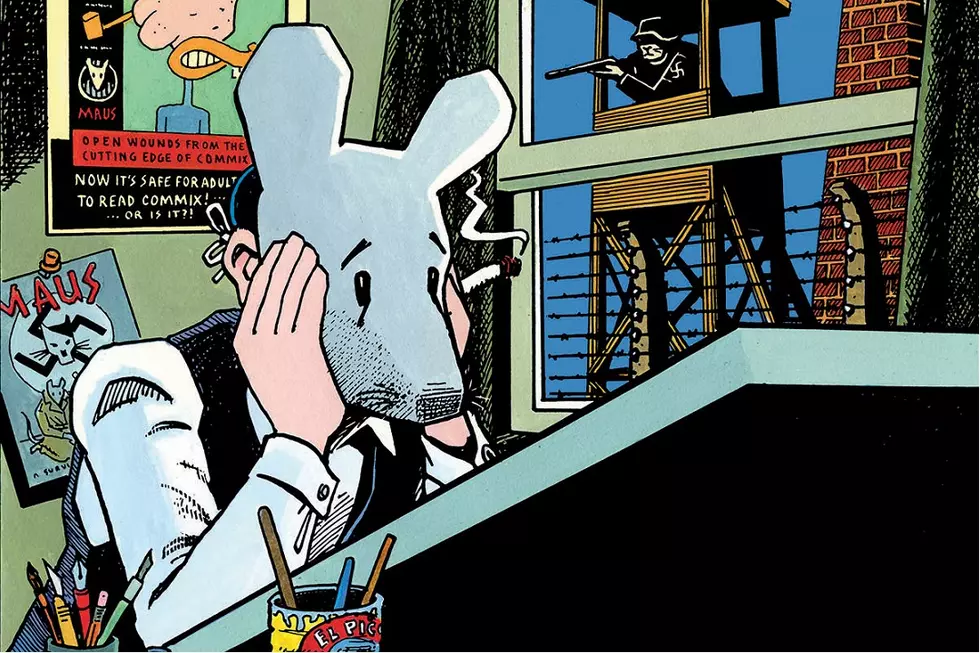
Bleeding History: Examining Art Spiegelman’s ‘Maus’
On this day in 1992, Maus, a two volume graphic novel by Art Spiegelman, became the first comic to win the Pulitzer Prize. Looking back, it's tempting to attribute that win, and indeed the book's acclaim in general, to the seriousness of the subject matter. And it couldn't be more serious: Maus tells the true story of Art Spiegelman's father, Vladek Spiegelman, and his experiences as a Polish Jew who survived the Holocaust, spending time in both Dachau and Auschwitz along the way.
In 1992, comics hadn't come nearly as far as they have since. It was still news to a lot of people that (bang, pow) comics aren't just for kids. So the idea that a comic book could deal with subject matter as heavy as the Holocaust wasn't just impressive, it was frequently regarded as shocking. That Spiegelman used a cartoon style and anthropomorphic animals for characters made the project that much more endearing to people who were inclined to see it as elevating the medium. In the years that followed Spiegelman became a sort of spokesman for comics among people who had little or no relationship to the form. From today's perspective it's easy to think, of course that guy won a Pulitzer for that book. In short, it's easy to be dismissive of Maus, but we really shouldn't be.
Let's talk first about Spiegelman's use of the "funny animal" genre. When you describe how Maus is done, it sounds way too cute for the subject matter. The Jews are mice, the Germans are cats, and the Americans are dogs. There's one French character who is of course a frog (Art Speigelman's wife, Françoise Mouly, was apparently transformed into a mouse by converting to Judaism). I can't imagine most Polish people would be thrilled about being depicted as pigs, but I guess there are only so many animals to go around.
But here's the thing: When you actually read Maus, this conceit totally works. It's actually a striking way to tell the story. On one level, obviously it mythologizes the deep cultural divides that undergird such a historical tragedy. Beyond that, it has the effect of making everyone look the same. When the Jews are stripped of their clothes and given camp uniforms, there's a real sense that their identities are being taken from them in a profound way, leaving them as mice in a cage. And the Nazi soldiers lack individuality too. The reader sees them the way the Jewish characters would have: As a terrifying pack of predators.
The animal conceit also allows Spiegelman to play with the idea of passing. When Vladek and his wife Anja are in hiding among the Polish people, they wear pig masks. But Anja's recognizably Jewish appearance is depicted as a long mouse tail trailing from the back of her coat. Again, it sounds like a painfully cute idea in the midst of a deadly serious story, but it gets the point across in a clever and direct way, and the unique tone Spiegelman achieves throughout the book makes it feel appropriate.
The other wonderful thing about Maus, which is too often ignored, is the way the narrative turns in on itself, depicting the making of the story even as the story is told. Equal to the scenes of Vladek and Anja in Europe are the scenes of Art going to visit Vladek and his second wife in Queens, to get him to tell the story. The Vladek of the Holocaust is a hero, while the elderly Vladek is a judgmental, stingy, and racist old man who's almost impossible to get along with. It's Art, and the reader, who must find a way to reconcile these two Vladeks, and indeed to realize that it may well have been the same qualities that now make him obnoxious which enabled him to survive in a Hell that was bent on killing him. His meticulousness, his insistence on saving as much as he uses of every resource, his distrust of strangers: Art struggles with the question of whether the Holocaust made his father this way, but as the story develops it becomes clear that being this way is what made him survive the Holocaust.
The more you read of Maus, the more beautiful and moving Spiegelman's cartooning seems. He employs little visual tricks throughout, especially in the Holocaust scenes, which often seem to be less Vladek's memory of that time than Art's imagination responding to Vladek's words. Fittingly, there is often a bit of the style of German Expressionist cinema in these scenes, with the landscape and buildings twisting to represent the characters' peril and fear.
And somehow, even though the characters lack human faces, and mostly lack any physical individuality to speak of, Spiegelman imbues each mouse with personality and character. Art's mouse head with a cigarette dangling can look doubtfully at his father without even the benefit of an actual facial expression.
One of the most striking scenes in the book is a moment in Volume 2 that completely breaks the Fourth Wall. Art Spiegelman appears not as a mouse, but as a middle-aged human man in a mouse mask. He talks about dates and time in a way that he avoids in most of the rest of the book. You can see the artist (you can literally see the artist) struggling under the weight of what he has clearly come to realize is his Magnum Opus. Vladek has long since died, and Art is burdened with not only making sense of his father's life, but of the massive atrocity that dominated that life, and ended the lives of millions.
Because of the scene's specificity, it has an effect that I'm not sure any other comic I've ever read has yet matched. This isn't just autobiography. This is a man, in February 1987, turning and looking at you, the reader living in the future, and explaining his feelings to you. All of Maus is moving, of course, but this moment reaches out and grabs you in an especially intense and direct way. It's a perfect demonstration of what an amazing comic this is throughout. Whatever legacy we assign it, all these years later, we certainly can't call Maus overrated. It was like no comic that came before it, and has been matched by few since. It earned that Pulitzer Prize, and all the acclaim that came with it.
More From ComicsAlliance


![Running the Gauntlet in Mark Beyer’s Cruelly Funny ‘Agony’ [Review]](http://townsquare.media/site/622/files/2016/02/agony5.jpg?w=980&q=75)

![Earn An Education In The Comics Life With The ‘Cartoon College’ Movie [Video]](http://townsquare.media/site/622/files/2013/06/cartooncollegedvdcovertop.jpg?w=980&q=75)


![‘Masters of Comic Book Art’ Documentary Reemerges from the VHS Ether [Video]](http://townsquare.media/site/622/files/2012/02/untitled-2-1330485123.jpg?w=980&q=75)
![‘MetaMaus’ Takes Readers Behind The Scenes Of Art Spiegelman’s Celebrated Graphic Novel [Video]](http://townsquare.media/site/622/files/2011/09/metamaus.jpg?w=980&q=75)
